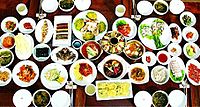
Photo from wikipedia
Abstract Pfaffia paniculata (Brazilian ginseng) is a medicinal plant that is thought to have anti-inflammatory, anabolic, gastroprotective, antioxidant, and pigmentation properties. This study was conducted to evaluate the effects of… Click to show full abstract
Abstract Pfaffia paniculata (Brazilian ginseng) is a medicinal plant that is thought to have anti-inflammatory, anabolic, gastroprotective, antioxidant, and pigmentation properties. This study was conducted to evaluate the effects of P. paniculata supplementation in ground sorghum-based diets on Japanese quail laying performance, and quality and shelf life of eggs. Two hundred and ten Japanese quails (28 d old) were housed in 30 cages, which were considered the experimental units. Cages were randomly allocated to 5 treatments (6 cages per treatment and 7 Japanese quails per cage), as following: ground corn-based diet (COR); and ground sorghum-based diet (SOR), with increasing content (0, 2, 4, or 6 g/kg) of P. paniculata. The evaluation period started when animals found 0.5/d of laying rate (55 d old) and lasted 56 d, divided into four subsequent sampling cycles. All eggs were sampled from d 12 to 14 of each cycle. Eight eggs from each cage were stored either refrigerated (4 °C) or at room temperature (28 °C). Egg quality was evaluated before (0 d), and after 10, 20, and 30 d of storage. Data were analyzed using the PROC MIXED of SAS. The effects of treatment were decomposed in orthogonal contrasts to evaluate SOR vs. COR; linear and quadratic effect of P. paniculata. Sorghum-based diets increased (P = 0.01) feed intake and decreased (P = 0.02) laying ratio and egg weights in relation to COR. Dietary supplementation with P. paniculata linearly decreased (P = 0.02) feed conversion ratio (kg/dozen) and quadratically affected (P = 0.02) the weight of the eggs, whereas the greatest weights were estimated when feeding P. paniculata at 2.96 g/kg. Sorghum-based diets decreased (P
Journal Title: Livestock Science
Year Published: 2019
Link to full text (if available)
Share on Social Media: Sign Up to like & get
recommendations!